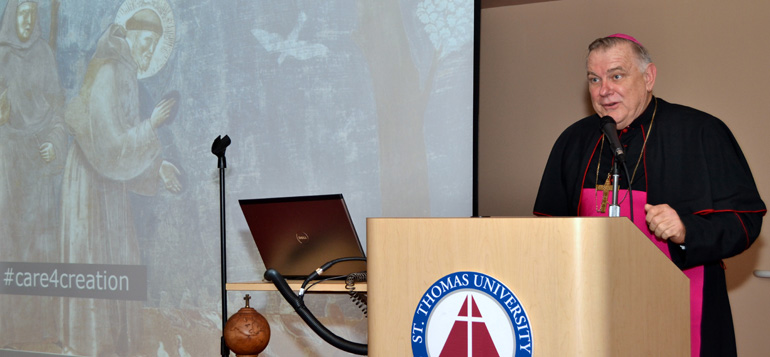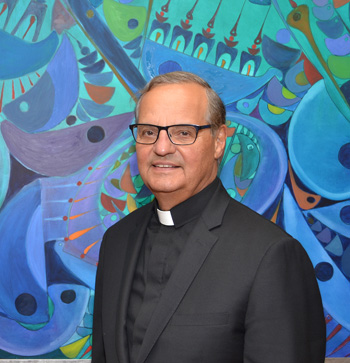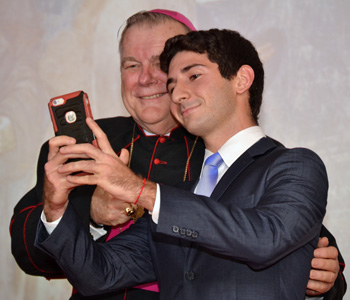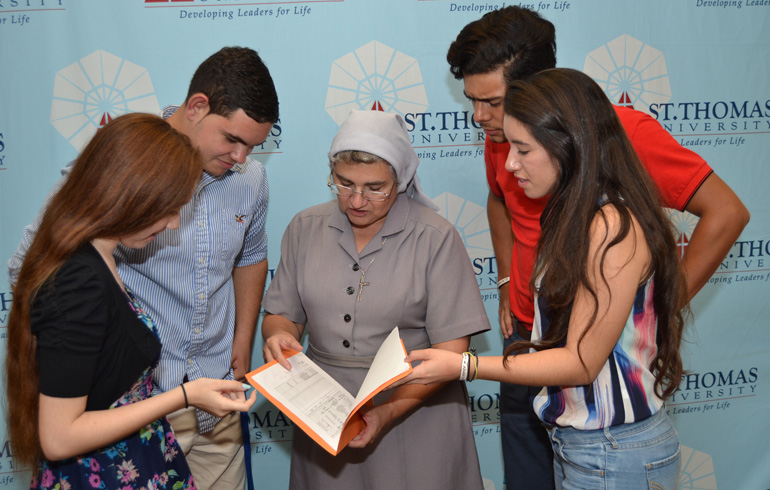By Jim Davis - Florida Catholic

Photographer: Jim Davis
Archbishop Thomas Wenski discusses Pope Francis' encyclical Laudato Si' at freshmen convocation.
MIAMI GARDENS | Nearly 200 new college students got an "extra" at their first assembly at St. Thomas University: inspirational talks on saving the environment.
A high-powered speaker list, led by Archbishop Thomas G. Wenski, angled the school's first-ever freshman convocation toward Laudato Si' -- On Care For Our Common Home, Pope Francis' encyclical on caring for the earth and its people.
"We wanted inspiration for our professors and students," said university president Msgr. Franklyn Casale, who gave the welcoming speech at the Goldbloom Convocation Hall. "And there haven’t been a lot of explanations on Laudato Si'. It's not simply about the earth, but who we are as humans relating to one another. We need to reflect on it and publicize it."
The topic was also chosen to prepare the students for the papal visit to Cuba and the United States, scheduled for Sept. 19-27. "I think we'll hear a lot about [Laudato Si'] when Pope Francis comes to the United States," Msgr. Casale said.
About 380 people attending the Sept. 9 convocation at St. Thomas, including 197 incoming freshmen. Among the rest were faculty, parents, student leaders and 72 students visiting from eight Catholic high schools.

Photographer: Jim Davis
Msgr. Franklyn Casale, president of St. Thomas University, in his office. Behind him is a mural by a Cuban immigrant, donated to the university.
Besides Msgr. Casale and Archbishop Wenski, the speakers included university provost Irma Becerra, professors Elisabetta Ferrero and Joe Holland, student government president Joshua Rosner, Nelson Araque of the Catholic Climate Covenant, and Msgr. Terence Hogan, dean of the School of Theology and Ministry.
The students fell silent as they watched a video produced by the Vatican as an intro for themes of Laudato Si'. Forests, oceans and mountains panned by in the six-minute video, followed by urban sprawl and gulls picking through a garbage mound.
Subtitles in English, Spanish and Italian highlighted the need for an "integral ecology" that respects human dignity. "The faith of Christians motivates them to care for nature and for the most vulnerable of their brothers and sisters," it read, drawing applause.
Archbishop Wenski, the main speaker, gave his interpretation of the papal encyclical, published in mid-June. He pointed out that the pope calls not just for conservation but for an "integral ecology," with equal emphasis on relationships "with God, with our neighbor and with the Earth itself."
Therefore, the archbishop said, protecting rain forests is related to matters like stopping abortion and pornography, defending traditional marriage, caring for the poor and limiting the technology that each person brings into his or her life.
"Technology is not neutral," he said. "What we invite into our world begins to shape our lifestyles and decision-making. Our priorities in this area reveal the type of society we want to build.
"Pope Francis wants us to connect the dots between what could be called a natural ecology and what might be called a human or social ecology," he said. "In place of isolation and use of one another, the pope proposes a culture of encounter and solidarity."
Professor Ferrero, herself a pioneer in faith-based ecology, praised Laudato Si' "as a woman of faith and someone who cares deeply about the natural world." Ferrero, professor of history, philosophy and global studies, noted that the document says "it is the human beings above all who need to change."
"And change we must," she continued. "We must change radically our way of thinking, and we must change our lifestyles in order to restore the natural world and human dignity. We must stop consuming and acquiring excessively -- having less so that others will have enough."

Photographer: Jim Davis
Archbishop Wenski poses for a "selfie" photo with Joshua Posner, student president at St. Thomas University.
Holland, a professor of philosophy and religion, said Western Christians need to re-learn a proper relationship to nature. In his response to Archbishop Wenski's speech, he said the loss of that orientation has "led modern Western industrial-colonial civilization to become the first civilization ever in human history to begin so thoroughly to destroy on planet Earth God's beloved plants, animals, soil, water, air, and even humans.
"The West's loss of ecological spirituality is the deep cause of late modern ecological devastation," Holland said. "In Laudato Si', Pope Francis retrieves for us the authentic world-embracing gospel of Jesus that proclaims the salvation of all creation."
Even Joshua Rosner, president of the student government, worked the environment into his own welcome speech. He talked about St. Thomas' solar energy station and its woodsy campus.
"Walk around -- you may even see a bobcat," he said, drawing laughs and applause from those who knew the university's mascot.
More laughs followed when Rosner invited Archbishop Wenski back onstage, then whipped out a cellphone and shot a selfie of them both.
Turning serious, Rosner urged his listeners to spread the word about Laudato Si' via Twitter, using the hashtag #CARE4CREATION. The idea was to tweet "viral messages" on the themes of the encyclical.
Afterward, some students said they were impressed by the theme and format of the convocation.
"It was enlightening," said Alyssa Sanchez, a graduate of Monsignor Pace High School in Miami Gardens. "It makes me concerned about how I care for the environment."
Paolo Ariano of Doral Academy found the talk "persuasive. The environment needs our help. We need to do our part."
Casey Panella, already a freshman student at St. Thomas, found the talks "uplifting," especially Ferrero's. "I learned that if you’re closer with nature, you’re closer with God."
It was the third time Archbishop Wenski has expounded on Laudato Si', he said later. He spoke on it in July at the University of Portland, Ore., then in August for social ministry leaders in this archdiocese.
"It's had the most expectations of any modern encyclical, and it's been hyped by the media," he said in an interview. "And I think this generation is more sensitized to ecological issues."
Holland agreed in an interview after the convocation. "There is an ecological, social and spiritual breakdown of the modern form of western civilization. My experience is that students today are more open to that. They may not know all the words, but they have a deep sense of the crisis."

Photographer: Jim Davis
Sister Ondina Cortes of St. Thomas University discusses the academic year with incoming freshmen Sept. 9. From left are Alyssa Sanchez, Manuel Diaz, Sister Ondina, Paolo Ariano and Natasha Lopez.


Comments from readers